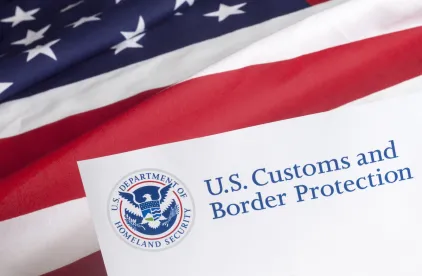COVID-19 Remote I-9 Flexibility Policy Extended Again
As of March 20, 2020, and now extended through September 19, 2020, the U.S. Department of Homeland Security (“DHS”) is permitting a limited I-9 compliance flexibility policy for employers and workplaces that are operating remotely to “defer the physical presence requirements associated with Employment Eligibility Verification (Form I-9).” This means that if “physical proximity precautions” are being taken due to COVID-19 and there are no employees at all physically present at a work location, then employers will not be required to review employee identity and employment authorization documents in person. Employers must still inspect documents and complete Section Two of Form I-9 within three days of hire, but may do so remotely via “video link, fax or email, etc.” If employers with all employees working remotely choose to utilize the COVID-19 emergency provisions, then DHS has provided specific instructions for I-9 completion during this time, as noted in our March 21, 2020 client alert here.
Outside of the COVID-19 remote flexibility policy, pursuant to I-9 compliance provisions, at any time an employer may designate a person it chooses in any location to serve as its authorized representative for the purposes of verifying documents in-person and completing Section Two of Form I-9. The employer is still liable for all I-9 completion and compliance requirements.
Additional temporary policies permitting an employer to accept certain expired List B identity documents remain in place. Please refer to government updates here.
Also, USCIS has announced a temporary policy permitting an employer to accept as a List C Document the Form I-797 Approval Notice for a an I-765 Application for Employment Authorization (“EAD”). The approval notice may be used if it has a notice date on or after December 1, 2019 through and including August 20, 2020. Previously, I-797 approval notices did not serve as sufficient evidence for I-9 purposes, and only the post-approval EAD cards could be used for I-9 purposes. Production of EAD cards has been significantly backlogged, and, therefore, USCIS has implemented the temporary policy to accept I-797 notices. Please refer to the government alert here.
Finally, whether or not an employer is utilizing any temporary COVID-19 policy, employers should document special actions taken to address fact-specific situations during COVID-19 and ensure all records are being maintained consistently and accurately.
I-9 Compliance
The Immigration Reform and Control Act of 1986 (“IRCA”) prohibits employers from knowingly hiring/continuing to employ, recruiting, or referring for a fee any individual who is unauthorized to work in the United States. Through IRCA, the federal government requires all U.S. employers to verify the identity and employment authorization of each person hired by documenting this information using the Employment Eligibility Verification Form I-9. All employers are required to maintain the original I-9 forms of current employees for inspection. In addition, employers are required to retain the original I-9 forms of former employees for at least three years from the date of hire or for one year after the employment relationship ends, whichever is longer. If an employee submits work authorization documents with expiration dates, then the employer is expected to re-verify the employee’s work eligibility on or by that expiration date.
Immigration and Customs Enforcement (“ICE”) is one of the main agencies that enforces this federal law, often by conducting I-9 audits, and with increasing regularity through work site raids (even during the COVID-19 pandemic). Employers should review the guidance below and be proactive with compliance items to avoid possible criminal and civil sanctions.
Compliance Audits vs. Worksite Raids
I-9 compliance investigations may take the form of I-9 audits or worksite raids. Of the two types of I-9 compliance investigations, I-9 audits are more common and tend to be more routine in nature, although they can still result in significant civil penalties in cases of noncompliance or substantive error. A notice of inspection (“NOI”) informs employers that ICE is going to audit employee hiring records to determine whether they are complying with the federal law. Upon receiving the NOI, the employer should contact an attorney for help in navigating the audit process.
Worksite raids by contrast are usually the result of more targeted investigations. These can be opened by ICE on its own or upon receiving tips that an employer is hiring undocumented individuals or other individuals who are not authorized to work in the U.S. Raid enforcement actions often result in the arrest of employees without work authorization. As soon as a worksite raid begins, the employer should contact an attorney for help. Employees encountered during these investigations who are unauthorized to work in the U.S. may be subject to removal from the U.S.
In preparing an action plan to address I-9 compliance enforcement actions, be mindful of the comparison chart below:

Additionally, employers may review the resource guide HERE.
Violations & Penalties
Following an I-9 audit or worksite raid, employers generally have ten days to correct technical Form I-9 errors (such as typographical errors). After this time period, the employer may be held liable for uncorrected technical violations, substantive violations, or knowingly hiring/continuing to employ individuals without U.S. work authorization. Employers are not provided the opportunity to remedy substantive violations or violations relating to knowingly hiring/continuing to employ individuals without U.S. work authorization to avoid penalties.
Financial penalties for substantive or uncorrected technical violations range from hundreds to thousands of dollars per incident, while financial penalties for knowingly hiring/continuing to employ unauthorized workers can cost an employer over $20,000 per incident. In addition to civil fines, employers can also face debarment from government contracts or court mandated backpay/rehiring individuals who were discriminated against. In some cases, criminal penalties may be imposed. In issuing penalties, ICE considers five factors: (i) the size of the business; (ii) the employer’s good-faith effort to comply; (iii) the seriousness of the violation; (iv) the involvement of unauthorized workers; and (v) the employer’s history of previous violations.
Be Proactive: Audit Checklist for Employers
Since ICE may begin an investigation unannounced, the best way to prepare for a compliance audit or work site raid is by developing a detailed action plan to execute in the event that ICE comes to the work site. Below is a general checklist for formulating an action plan:
-
Appoint specific staff, with backups, to immediately interact with ICE when they arrive; provide reception or front desk staff with the names of these contacts to ensure minimal disruption to your workplace.
-
Designate an appropriate area to take ICE where they can get established without disrupting the operation of your workplace.
-
Designate a person proficient in I-9 completion to conduct periodic internal audits as well as occasional external audits through immigration counsel to find potential issues with your I-9 forms and assess your I-9 intake and completion processes and procedures.
-
Use “tickler” and systemized storage to create separate sets of files for:
-
former employees;
-
current employees who will require I-9 reverification;
-
current employees who will NOT require reverification; and
-
sub-contractor records (agreements, attestations, I-9 copies).






 />i
/>i
